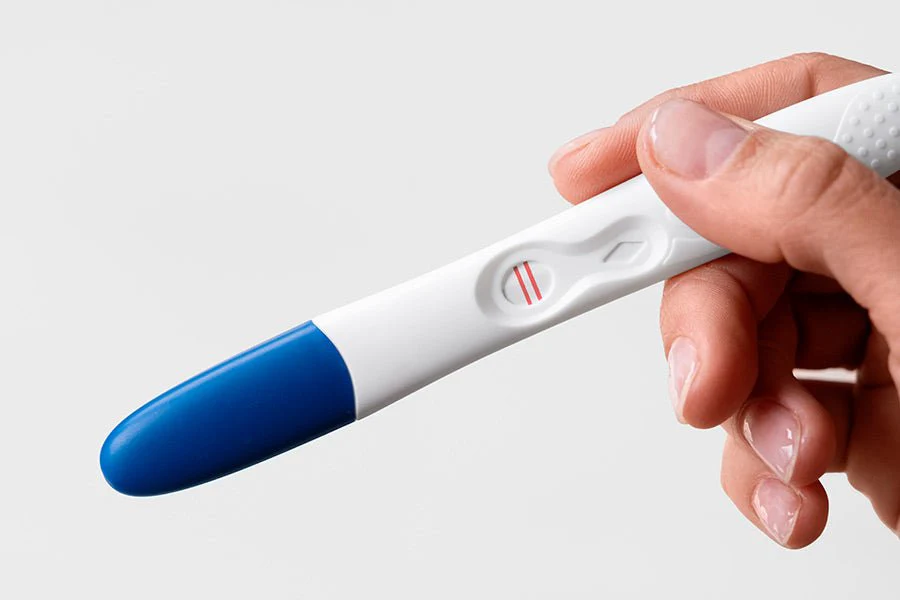How Do I Know If My Early Pregnancy Symptoms Are Real?

Finding out you are pregnant is one of the most joyful moments in the lives of women. In most cases, women get to know they are pregnant through early pregnancy symptoms [1]. However, these symptoms can be confusing and raise questions like, “How do I know if my early pregnancy symptoms are real?”
In this article, we will discuss the common symptoms a woman experiences during the early stages of pregnancy. This article is also a guide on when you need to go for a pregnancy test to confirm if your pregnancy symptoms are real.
Early Pregnancy Changes in the Body
Pregnancy begins when a fertilized egg implants into the uterus [2]. The implantation initiates different changes in the body, such as the release of human chorionic gonadotropin (hCG) and progesterone [3]. These changes usually begin about one to two weeks after conception.
For many women, this is around the time when they expect periods. Since pregnancy stops the menstrual cycle, missing periods is the initial sign that you might be pregnant. At this stage, it is important to note some other early symptoms, such as nausea or fatigue. However, remember that these symptoms can be similar to premenstrual syndrome (PMS), so they may not always mean pregnancy [4].
Common Early Pregnancy Symptoms
What you will experience during the early stages of pregnancy can be different from what other women might experience. However, there are some common symptoms that most women feel during this time. These are:
-
Missed Period
Most women experience missing periods as the initial and most obvious sign of pregnancy [5]. If your menstrual cycle is regular and you suddenly miss a period, this could be a strong indication that you are pregnant.
However, stress, abrupt dietary changes, or certain medical conditions can also disturb your menstrual cycle and cause a missed period. If your cycle is irregular, it can be tricky for you to notice this initial symptom of pregnancy.
-
Nausea or Morning Sickness
Reports show that most women experience nausea during the first trimester of pregnancy [6]. This can start as early as two weeks after conception. This symptom is common in the morning, hence the name morning sickness, but you can also experience it at any time of the day.
Some women feel nauseous but do not vomit, while others may experience both. The exact cause of nausea is not fully understood, but it is linked to hormonal changes during pregnancy.
-
Fatigue
Feeling very tired is another common early sign of pregnancy. Progesterone levels start to rise soon after pregnancy, and studies show that increased levels of this hormone can make you feel sleepy and drained of energy [7].
Another reason why you feel fatigued is because your body starts to work hard to support the developing baby. If you feel unusually tired in the days after unprotected sex, it is a good idea to rest more and note other symptoms.
-
Tender or Swollen Breasts
When you achieve pregnancy, your body prepares for breastfeeding, and this can cause your breasts to feel tender, heavy, or swollen. You might also notice that your nipples are more sensitive or that the area around them, called the areola, becomes darker in color [8].
These changes can happen early in pregnancy and are often one of the initial signs that most women notice when looking for pregnancy changes in the body.
-
Frequent Urination
If you find yourself needing to use the bathroom more often than usual, it could be a sign of pregnancy [9]. Hormonal changes increase blood flow to your kidneys, making them produce more urine.
This symptom can appear early in pregnancy and may continue as the baby grows. In the early stages, it is due to more urine production, but in the later stages, the increased size of the uterus presses the bladder, making you feel the urge more frequently.
-
Food Cravings or Aversions
Many pregnant women experience unusual food cravings or find themselves suddenly disliking certain foods or smells. Studies show that these cravings and changes in perception about foods are due to hormonal changes [10]. For example, you might crave sweets or salty snacks but find the smell of coffee or meat unpleasant.
-
Mood Swings
Hormonal shifts during pregnancy can affect your emotions, leading to more frequent mood swings. You might feel happy one moment and irritated or tearful the next. This is completely normal during the early stages of pregnancy as it is a result of the body's adjustment to pregnancy.
-
Light Spotting or Implantation Bleeding
Some women experience light spotting or bleeding during the time of implantation. This is called implantation bleeding and usually happens about 6 to 12 days after conception [11]. The bleeding is typically much lighter than a regular period and lasts only a day or two. Not all women experience this symptom, so if you don't experience such bleeding, this doesn't mean you are not pregnant.

-
Bloating or Digestive Changes
Hormonal changes during early pregnancy can slow down your digestive system, which can lead to bloating or constipation. These symptoms can feel similar to premenstrual syndrome, so it might be hard to tell the difference without considering other signs or going for a pregnancy test.
How Do You Know If Your Pregnancy Symptoms are Real?
If you suspect you might be pregnant because of early pregnancy symptoms, the best way to confirm is by taking a home pregnancy test. You can buy home pregnancy test kits from pharmacies near you or online. These test kits detect the hormone hCG, which is produced after a fertilized egg attaches to the uterus.
The accuracy of the pregnancy test depends on when you are performing the test. Experts recommend taking home pregnancy tests after you miss your period. Testing too early may give a false negative result because your hCG levels might not be high enough to detect.
If you get a negative result but still have symptoms, wait a few days and test again. If you are still not sure how to tell if your symptoms are real, you can also go for blood tests or an ultrasound to confirm the pregnancy.
When to Consult a Doctor?
If you notice sudden changes in your body but are not sure if they are due to pregnancy or any health condition, it is a good idea to consult a doctor. They can confirm your pregnancy with a blood test or an ultrasound.
If you have severe symptoms, such as heavy bleeding or extreme pain, immediate medical management becomes essential. Consultation in early pregnancy is also important as your doctor can guide you on early prenatal care, including dietary and lifestyle modifications for a healthy pregnancy.
Conclusion
Early signs of pregnancy can help you prepare for the next step, whether it’s confirming your pregnancy with a test or consulting a doctor. Women often ask how do I know if my early pregnancy symptoms are real. Most women experience missed periods, nausea, and fatigue as the early symptoms of pregnancy.
At-home pregnancy tests help you confirm if these symptoms are because of conception or related to something else, like premenstrual syndrome. If at-home tests aren't working for you, there are other more accurate ways to confirm your pregnancy, including blood tests and ultrasound. Having accurate information about when you have achieved pregnancy can help you prepare for the different challenges during pregnancy.
Resources Used
- Anderson, J., & Ghaffarian, K. R. (2023b, January 2). Early Pregnancy Diagnosis. StatPearls - NCBI Bookshelf. https://www.ncbi.nlm.nih.gov/books/NBK556135/
- Kim, S., & Kim, J. (2017). A Review of Mechanisms of Implantation. Development & Reproduction, 21(4), 351–359. https://doi.org/10.12717/dr.2017.21.4.351
- Nwabuobi, C., Arlier, S., Schatz, F., Guzeloglu-Kayisli, O., Lockwood, C., & Kayisli, U. (2017b). hCG: Biological Functions and Clinical Applications. International Journal of Molecular Sciences, 18(10), 2037. https://doi.org/10.3390/ijms18102037
- Kwan, I., & Onwude, J. L. (2015). Premenstrual syndrome. BMJ Clinical Evidence, 2015, 0806. https://pmc.ncbi.nlm.nih.gov/articles/PMC4548199/
- Nobles, J., Cannon, L., & Wilcox, A. J. (2021). Menstrual irregularity as a biological limit to early pregnancy awareness. Proceedings of the National Academy of Sciences of the United States of America, 119(1), e2113762118. https://doi.org/10.1073/pnas.2113762118
- Nausea during pregnancy: A good thing? (n.d.). Mayo Clinic. https://www.mayoclinic.org/healthy-lifestyle/pregnancy-week-by-week/expert-answers/nausea-during-pregnancy/faq-20057917
- Noreika, D., Griškova-Bulanova, I., Alaburda, A., Baranauskas, M., & Grikšienė, R. (2014). Progesterone and Mental Rotation Task: Is There Any Effect? BioMed Research International, 2014, 741758. https://doi.org/10.1155/2014/741758
- Alex, A., Bhandary, E., & McGuire, K. P. (2020). Anatomy and Physiology of the Breast during Pregnancy and Lactation. Advances in experimental medicine and biology, 1252, 3–7. https://doi.org/10.1007/978-3-030-41596-9_1
- Chen, H. J., Hsiao, S. M., Yang, C. F., Lee, C. N., Wang, Y. W., Guo, D. W., & Chang, S. R. (2022). Overactive Bladder during Pregnancy: A Prospective Longitudinal Study. Medicina (Kaunas, Lithuania), 58(2), 243. https://doi.org/10.3390/medicina58020243
- Healthdirect Australia. (n.d.-a). Appetite changes and food aversions during pregnancy. Pregnancy Birth and Baby. https://www.pregnancybirthbaby.org.au/appetite-changes-and-food-aversions-during-pregnancy
- Implantation bleeding: Common in early pregnancy? (n.d.). Mayo Clinic. https://www.mayoclinic.org/healthy-lifestyle/pregnancy-week-by-week/expert-answers/implantation-bleeding/faq-20058257





















